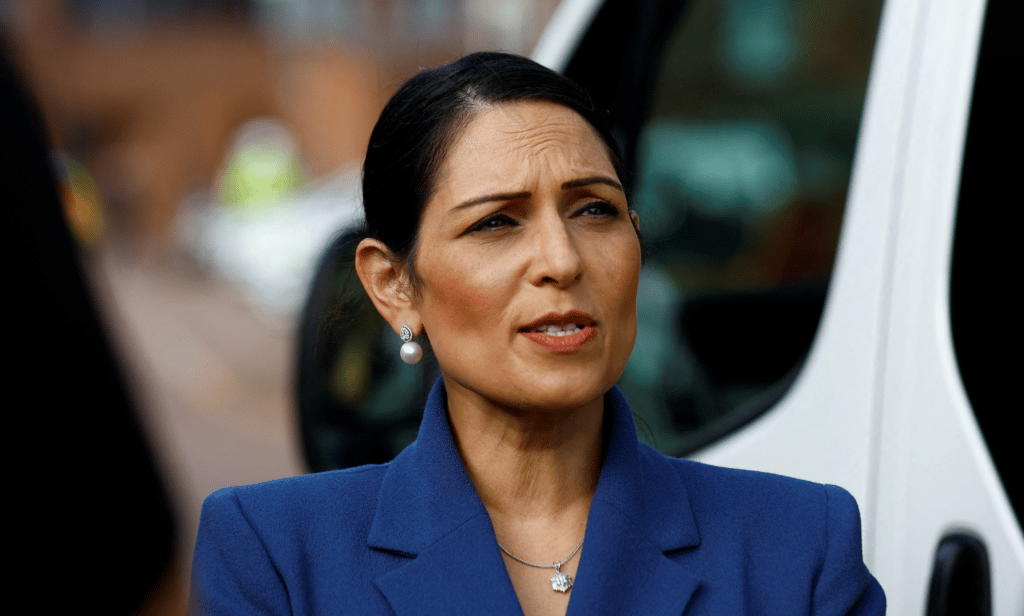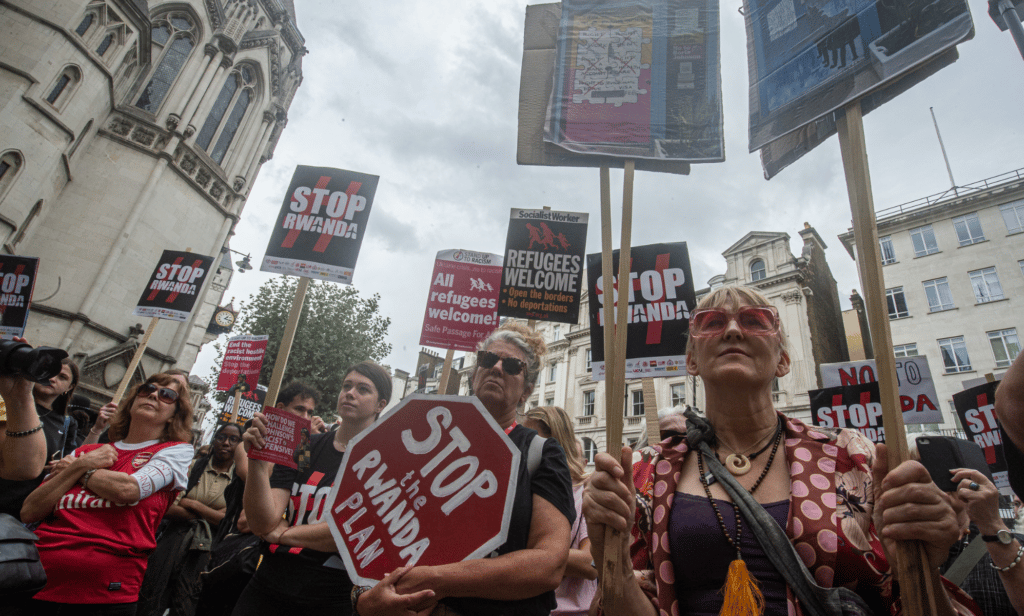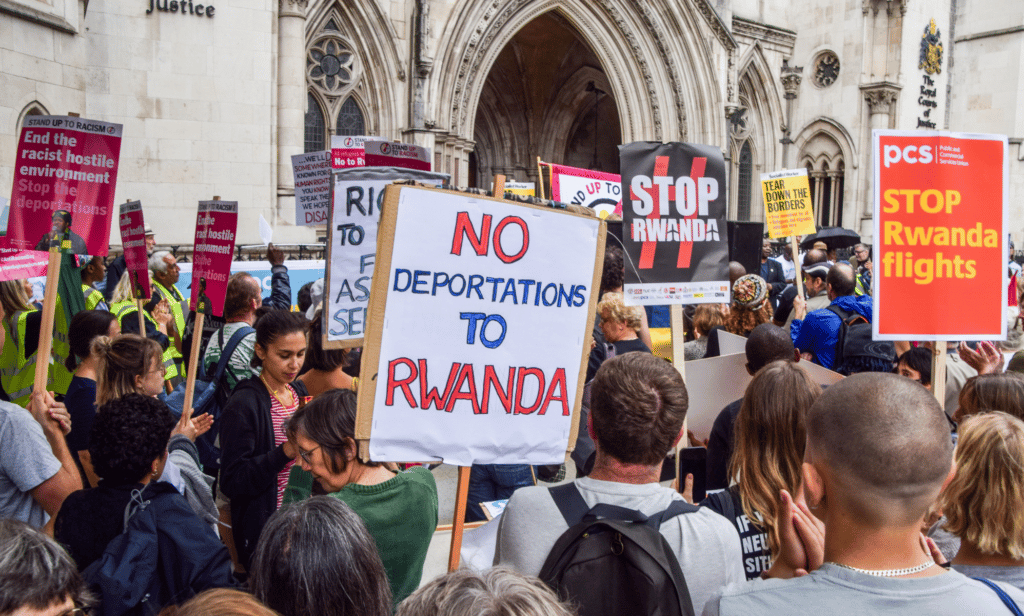Priti Patel’s ‘despicable legacy’ could end up hurting even more LGBTQ+ refugees

Priti Patel resigned as home secretary shortly after Liz Truss was elected as leader of the Conservative party. (Getty)
Priti Patel has left behind a “despicable legacy” as home secretary, paving the way for an even worse future for asylum seekers.
Patel, who has served as home secretary since 2019, announced on Monday (5 September) her decision to step down, in a letter addressed to outgoing prime minister Boris Johnson.
It had already been widely reported that her role was to be offered to Suella Braverman by new prime minister Liz Truss.
Patel wrote that the Tory government had “strengthened” the UK’s “proud track record of providing sanctuary and refuge to those in genuine need”.
She insisted leaving the government role was her “choice” and said it was “vital” Truss “backs all aspects” of her policies on “illegal migration”.
It has been the honour of my life to serve as Home Secretary for the last three years.
I am proud of our work to back the police, reform our immigration system and protect our country.
My letter to Prime Minister @BorisJohnson 👇🏽 pic.twitter.com/seTx6ikX25
— Priti Patel MP (@pritipatel) September 5, 2022
LGBTQ+ asylum charity, Rainbow Migration, said Patel “leaves a despicable legacy behind” as LGBTQ+ people seeking safety in the UK today are “more at risk because of her cruel immigration and asylum policies”.
Sebastian Rocca, founder and CEO of LGBTQ+ asylum seeker and refugee charity Micro Rainbow, told PinkNews that at “any other time”, her resignation “would have been a huge relief”, but that the future isn’t exactly bright.
“We live in unprecedented times and as the new appointment is made… we hold our breath. Could it be even worse?” Rocca said.
Patel’s plan to deport asylum seekers to Rwanda has faced immense backlash from migrant advocacy groups, LGBTQ+ advocates and MPs.
Truss supported the plan during her leadership bid, and it’s likely that she will expect Braverman, if she accepts the role, to expand the scheme.

Activists hope Priti Patel’s replacement as home secretary will be “motivated by humanity”. (Getty)
Rocca said Braverman’s potential appointment as home secretary is “not good news”, as she has “divisive politics, a poor voting track record on LGBTQI rights and has made anti-trans comments”.
“It reminds me of Priti Patel’s lack of empathy and humanity,” Rocca said. “I hope I will be proved wrong.
“We hope that the new prime minister will choose someone who is motivated by humanity and dignity for all, who does not use scapegoating politics and as a result, someone who is prepared to reverse some of the tragic changes introduced by Priti Patel: from the Rwanda policy, to increasing the standard of proof for asylum claimants to refusing to create legal safe routes for people fleeing deadly situations.”
He added: “For all of us at Micro Rainbow, Priti Patel’s legacy is clear: our beneficiaries, LGBTQI migrants, are more at risk than ever of being sent back to countries where they can be persecuted and even killed.
“This is not a legacy to be proud of and we call on the new home secretary to reverse Priti Patel’s inhumane policies.”

Rainbow Migration says Priti Patel “leaves a despicable legacy behind” as she handed in her resignation as home secretary. (Getty)
Patel’s three-year tenure in the Home Office was marred by bullying allegations and a reputation for cold-hearted, anti-refugee rhetoric.
She also pushed through her terrifying Police, Crime, Sentencing and Courts Bill, denied asylum to LGBTQ+ people seeking safety, and did little to nothing to tackle worsening hate crime rates. She has a decidedly conservative track record in politics.
Rainbow Migration described Patel’s Nationality and Borders Act as “one of the most regressive laws passed in parliament in years”.
It said the legislation will have a “significant impact” on LGBTQ+ people seeking asylum as it “raised the bar for proving their sexual orientation and/or gender identity” – increasing the “likelihood” they will be denied asylum and “sent back to dangerous situations”.

Priti Patel’s Home Office plan to deport asylum seekers to Rwanda has faced immense backlash from migrant advocacy groups, LGBTQ+ advocates and MPs. (Getty)
Patel’s Rwanda deal, that would see migrants that the UK government deems “illegal” sent to the east African country, was signed in April.
The Home Office pushed forward with the plans despite admitting there was “some evidence of discrimination and intolerance” towards LGBTQ+ people in Rwanda.
The first deportation flight, which was due to take off in June, was grounded amid a series of legal challenges.
In September, the High Court began hearing evidence that asylum seekers removed to Rwanda “face a significant risk of violation of their rights to be free from torture and inhuman treatment”.

People gather outside the High Court to protest against Priti Patel’s Home Office policy to deport asylum seekers to Rwanda. (Getty)
The claimants said in written submissions Patel and the government were “aware of, and appear to have had serious concerns, over Rwanda’s present and historic human rights record”.
Raza Husain QC, appearing on behalf of asylum seekers, told the court on Monday (September 5) Rwanda is a “one-party authoritarian state that does not tolerate political opposition”.
“It is a regime that repeatedly imprisons, tortures and murders those it thinks [are] its political opponents,” Hussain said.
“Those who protest or dissent from government directives, including refugees, are faced with police violence. All of those observations are drawn from our own government officials.”
A Home Office spokesperson argued Rwanda is a “fundamentally safe and secure country, with a track record of supporting asylum seekers”.

